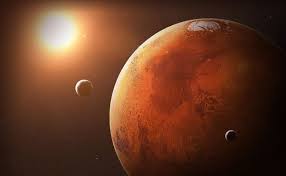Why Mars Is Referred To As The “Red Planet”
Mars is one of the planets that receives the most discussion since it has fascinated scientists and astronomers for millennia. Many people have often wondered about life on the planet and other things because of the neighboring planet’s remarkable crimson color. The most frequent query, however, is “Why is Mars red in color?”
The surface composition of Mars is one of the primary causes behind its red appearance. Rust is another name for iron oxide, which is present in it. Iron on Mars has experienced oxidation in a manner similar to that of iron on Earth that has been exposed to oxygen and moisture. As a result, the soil and rocks of Mars have a recognizable reddish hue.
Mars has a carbon dioxide-based atmosphere that is rather thin compared to Earth’s. The atmosphere scatters sunlight differently because of its lower density. When sunlight penetrates Mars’ atmosphere, the Rayleigh scattering takes place. Shorter light wavelengths like blue and green are produced as a consequence, while longer light wavelengths like red and orange are scattered more, giving the planet its reddish hue.
The historical occurrence of volcanic activity may also be a factor. The minerals and volcanic materials that are ejected during these eruptions might possibly affect the planet’s color. When exposed to the elements, certain volcanic materials often develop a crimson hue.
There’s also the chance of cyclonic dust storms. Mars is renowned for its cyclonic dust storms, which cover the planet in tiny dust particles. The red color is intensified as sunlight penetrates the atmosphere and strikes the dust.
In conclusion, it can be argued that a variety of variables, including the planet’s low atmosphere, excessive volcanic activity, dust storms, and the existence of significant iron oxide deposits on the surface, contribute to Mars’ red hue.
In addition, did you know that your weight would be lower on Mars than it is on Earth? Earth’s surface gravity is 38% greater on the red planet than it is on Earth. Therefore, if you weigh 75 kg on Earth, you will only weigh 28.5 kg on Mars.







